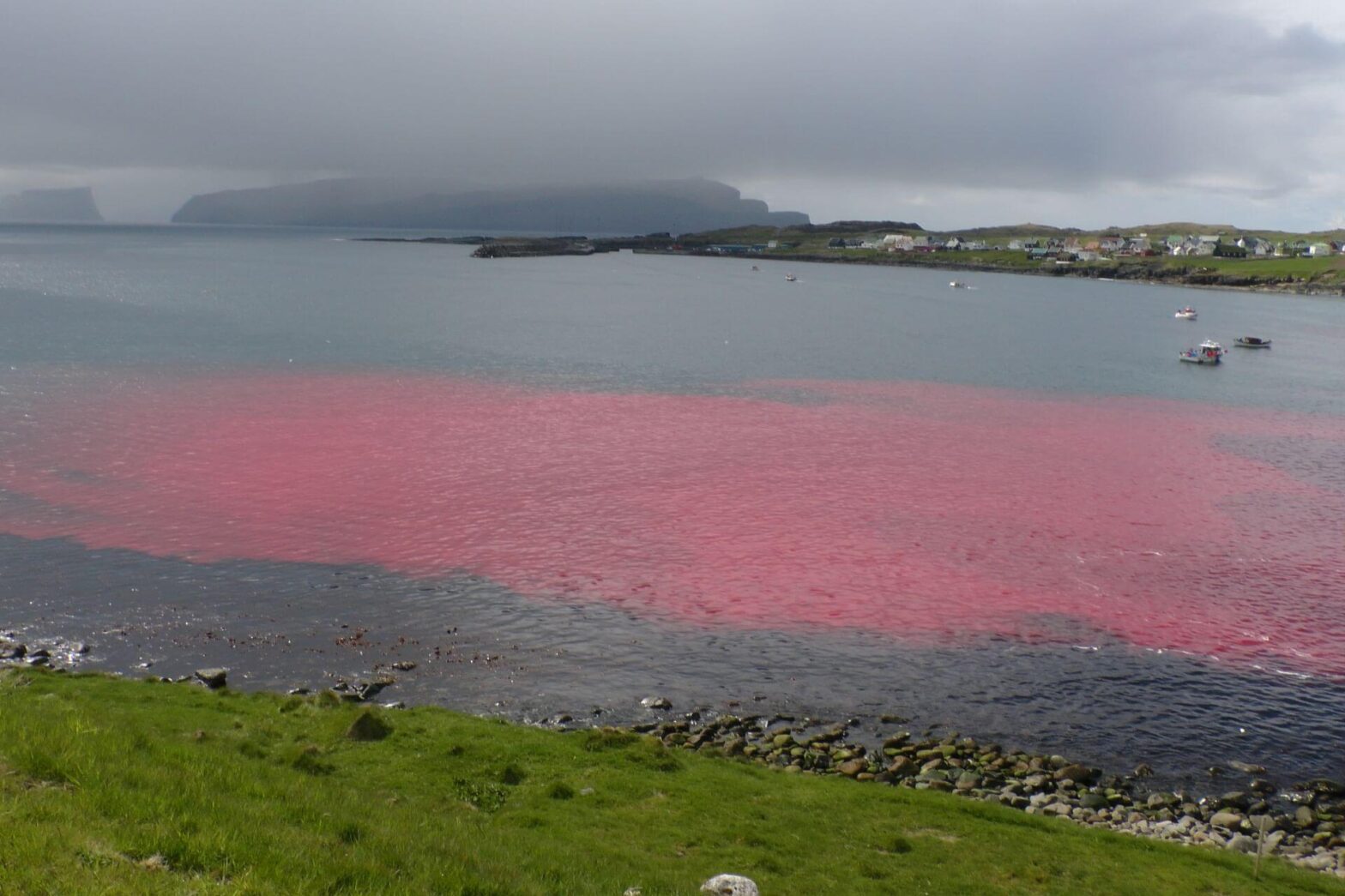EU Member States Condemn Faroe Islands Drive Hunts
In recent decades, the European Union Member States have remained largely silent on the killing of small cetaceans in the Faroe Islands, shying away from criticising a brutal and obsolete tradition. Today marks a turn-around on this previous political reluctance to condemn the Faroese drive. The EU and its Member States who are parties to the International Whaling Commission (IWC), but not including Denmark, issued a statement calling upon the Faroese Government to “immediately stop the outdated practice of whale and dolphin hunting”. The statement clearly criticises the mass-killing of more than 1,400 Atlantic white-sided dolphins on the Faroe Islands on 12th September 2021 as “cruel and unnecessary” and follows a critique voiced by EU Commissioner Sinkevicius.
“Finally! The EU is clear in its position condemning the blatant, unnecessary and cruel killing of whales and dolphins in these waters at the doorstep of the European Union”, welcomes Nicolas Entrup, Co-Director of International Relations at the international marine protection organisation OceanCare reacting to the statement.
“The deliberate killing of cetaceans in European waters, and especially in such numbers, fundamentally challenges all the conservation and welfare work being done for these animals elsewhere by people in European countries. Hence this reaction from the EU nations can be warmly welcomed and we hope that the concerns expressed will be understood in the Faroe Islands. explains Mark Simmonds, Director of Science, OceanCare.
OceanCare had previously reached out to the EU IWC Member States, and especially Denmark, urging the Danish government to engage proactively on this matter to convince the Faroese authorities as well as the people within the Faroe Islands to meet the objectives of the species and biodiversity legislation of the European Union, which relate to protecting all cetacean species, including the prohibition of direct takes. “It is disappointing to note that Denmark has not participated in this statement from the EU as it “does not correspond to the interests of the Faroese Islands” says Entrup of OceanCare.
On 12th September, at least 1,428 adult Atlantic white-sided dolphins and dozens of juveniles were driven ashore and cruelly killed in Skálafjørður in the east of the Faroe Islands in the Atlantic. Directed hunts on pilot whales, another dolphin species, continued just a few days after. OceanCare believes that in addition to the ethical and animal welfare viewpoint to stop this hunt, it is also neither sustainable nor does the science allow claiming it to be. The precautionary principle should be strictly applied, argues OceanCare.
Further information and links
- Link to Statement by EU and its Member States on the Faroe Islands dolphin hunt, published on the IWC website: https://archive.iwc.int/pages/view.php?ref=19399&k=
- Official numbers of whale and dolphin hunts: https://heimabeiti.fo/2013-2021
- Video: https://youtu.be/lB9E_PuHqFU
- OceanCare’s Report UNDER PRESSURE, Chapter 5 on the direct hunts of whales and dolphins in European waters: https://altewebsite.oceancare.org/wp-content/uploads/2021/04/UNDER-PRESSURE_Chapter-05_whaling_low-res_web.pdf
- Petition by OceanCare addressed to the European Commission and the European Member States: https://altewebsite.oceancare.org/en/topical/petitions/faroe-islands/
Denmark’s Role
The Faroe Islands are an autonomous region within the Danish Kingdom. They are not a Member of the European Union. However, Denmark represents the interests of the Faroe Islands and Greenland within the framework of international multilateral environmental agreements as well when finding a common position among EU member states. Accordingly, these vested interests have often been a barrier towards defining a more progressive position of the EU bloc within the International Whaling Commission (IWC).
The IWC’s Role
The 1946 Convention which established the IWC does not define a ‘whale,’ although the larger species were the ones that it sought to regulate the hunting of historically. OceanCare and the majority of the member nations of the IWC believe that its competence is for all cetaceans – some 90 species both large and small and living in the seas, oceans and some large rivers all around the world.
Whilst, the IWC has never regulated small cetacean hunts, and agreement has not been reached on whether it should in the future, it often issues advice on matters affecting all cetaceans. Additionally, there have been several IWC resolutions on small cetaceans expressing concern for the sustainability and welfare impacts of small cetacean hunts including 1995-1 (pilot whales); no single resolution on directed hunts of small cetaceans has been passed since 2001.
Given the extent of ongoing directed hunts of small cetaceans worldwide and all the other threats that these species currently face, it is important to confirm the IWC’s competence for small cetaceans and build on this. There is an urgent need for international collaboration among States, as well as improved collaboration between the IWC and other relevant multilateral and regional agreements to strengthen the global regime for cetacean conservation.
